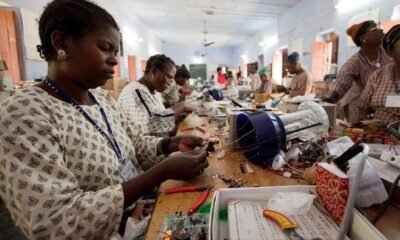Business
Will Digital Money Perform Same Wonders In Nigeria?

Would you believe that digital money is doing wonders in motivating workers in regions in Africa?
This is against a situation where some people would prefer cash payments for goods sold or services rendered.
The preference to digital money, a report by the World Health Organisation (WHO) has indicated, is in connection with frontline health workers in other African countries but not Nigeria.
The agency, referencing with its campaigns in Africa to stop polio and other diseases.
It says the campaigns have seen to a more stable and better-motivated workforce after it collaborated with countries and partners to pay frontline health workers through their mobile phones instead of in cash.
READ ALSO: Foreign Exchange Market: CBN Rolls Out Dos & Don’t For Commercial Banks
“Over 80 percent of workers are saying they prefer the digital payments,” said Ahmed Hamani Djibo, head of WHO’s Digital Finance Team.
The report says WHO had been leading among international organisations in moving away from the unwieldy, less-secure practice of disbursing salaries in cash.
This is with the result that over the past few years, the Organisation launched its Digital Finance Team and joined the Better Than Cash Alliance, an 80-member United Nations partnership with a mandate to develop the digitisation of payments and expand financial inclusion – activities that support the UN Sustainable Development Goals.
WHO’s Digital Money Team was established in 2020, and ever since has designed and implemented digital payment solutions in 24 countries in Africa, including, Benin, Botswana, Madagascar, Rwanda, Togo and Zimbabwe where the system flagged off last year.
“WHO has successfully digitized payments for more than two million health workers across Africa,” said Tidhar Wald, Managing Director, a.i., at the Better Than Cash Alliance.
“With these inspiring results, WHO is taking a clear leadership role in accelerating the digital transformation in the provision of health outcomes globally?”
READ ALSO: Earn In Dollars & Pounds: A Guide To Export Business
According to the global health organisation, workers surveyed in Côte d’Ivoire, Liberia and Tanzania said they appreciated the security of not carrying cash, the convenience of no longer having to travel to a disbursement site to receive their wages, and above all, the speed of payment – as short as half an hour after finishing work compared to waits of weeks or even months.
It is not however stated how the innovation would be perceived in Nigeria, although digital payment system is equally gaining tremendous grounds in the largest country in Africa.
Conversely, the WHO surveys, funded by the Bill & Melinda Gates Foundation, linked timely compensation to better morale and worker retention.
“There is really a big difference in speed,” said Jean-Luc, a health worker interviewed in the Democratic Republic of Congo (DRC) at the end of a polio immunisation campaign.
“We finished the campaign mop-up yesterday and received a text notification the next evening. I’m going to pay my child’s school fees. Now we can relax”, the report said.
The question however is: Can digital money fare this well in Nigeria?























